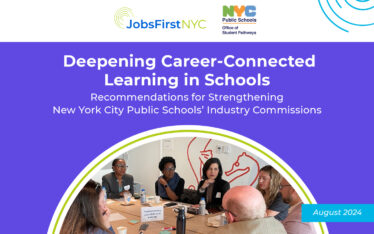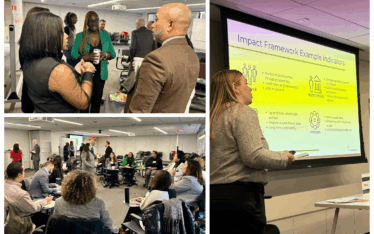Bedford Stuyvesant is a hub of culture, talent, and opportunity. While Brooklyn millennials grew up admiring Bed Stuy legends like Biggie Smalls, Yasiin Bey, Jay-Z, Lil’ Kim—and memorized countless songs dedicated to highlighting the ups and downs that Bed Stuy residents experience every day—their beloved neighborhood has seen drastic changes leaving young adults today questioning their prospects. Now, in the midst of a global pandemic, the social, economic, and opportunity disparities that have plagued Bed Stuy for decades give us insight into what the future might hold for the neighborhood’s next generation.
Bedford Stuyvesant has seen the largest population growth of any neighborhood in New York City (between 1980-2015), which has bolstered hospitality and retail businesses in the area, according to a 2017 report from the New York State Comptroller’s Office. Despite this economic growth, residents of Bed Stuy have seen a 13 percent increase in the number of households living below the poverty line since the end of the Great Recession. Prior to COVID-19, the rate of young adults who were out of school and out of work was 29 percent, a hair-raising number that initiated Councilman Robert Cornegy Jr. to act. He invited JobsFirstNYC, a workforce development nonprofit intermediary, to convene organizations serving Bed Stuy residents to tackle this crisis. From there, the Youth Employment Services of Bed Stuy (YES Bed Stuy) partnership was formed.
However, widespread poverty doesn’t just call into question economic mobility for a community. It strains every system, social safety net, and resource a community has, especially during a crisis. As of May 2020, Bed Stuy saw a 9 percent mortality rate with deaths of over 600 people from COVID-19. A virus with a 3% mortality rate showed how the social and economic disparities triple the risk of death for individuals and communities like Bed Stuy battling poverty. This striking contrast becomes more evident when you examine the highest number of confirmed COVID cases in a single NYCHA development – Marcy Houses, where global icon Jay-Z was born and raised. Bed Stuy has experienced a growing wealth gap since the Great Recession and now, a local economy that grew from expanded hospitality/retail industries is faced with the COVID-19 pandemic which has crippled the service industry and disproportionately affected the well-being of Bed Stuy residents.
For young adults, who often enter the workforce through retail and hospitality roles, what options are we leaving them to overcome these systemic barriers? If the biggest example of economic mobility they’ve seen is the creation of hip-hop’s first Billionaire by immortalizing their poverty through song lyrics sung from their homes to around the globe—and all the while, the prospects for their own survival and stability are dwindling—what message are we sending about Bed Stuy? What message does it send to young adults when the stories of their poverty can bring prosperity, notoriety, and opportunity to so many (record labels, clothing brands, real estate developers), except them?
These concerns are growing among local residents in Bed Stuy, and with good reason. According to a 2016 study from the Furman Center, between 1990-2014 Bed Stuy saw a 36 percent increase in the average rent while average incomes increased by just 21 percent. With fears of the “Starbucks Effect” promising new economic opportunities only to end up creating further economic disparity, even job training opportunities have been perceived by local residents as the exploitation of young, cheap labor leading to dead-end jobs. Understanding this community’s fraught history with economic development and its impact on young adults in the area was the initial step towards developing the Yes Bed Stuy partnership when they first began convening in 2018.
Community trust in Bed Stuy has been damaged, which is why the YES Bed Stuy Partnership has set out to provide gainful employment pathways (meaning jobs in growing industries, requiring specialized skills and earning a livable wage; commonly considered $40K+) as a collective, with the young adults of Bed Stuy steering our efforts. For Bed Stuy, this means diving deeper into the aspirations, desired outcomes and career planning needs that young adults express in community meetings and matching those young adults to job training and career pathways. By equipping them with in-demand skills in burgeoning industries, a supportive network of organizations and peer mentors, and services to remove barriers to employment (like housing insecurity, food insecurity, transportation issues), JobsFirstNYC and the YES Bed Stuy partnership believe they can support the social-emotional well-being and economic mobility of young adults in Bed Stuy.
YES Bed Stuy has brought together organizations like the Bed Stuy Restoration, Bridge Street Development Corporation, Brooklyn Community Pride Center, Brooklyn Community Services, CAMBA, The HOPE Program, Kingsborough Community College, The Marcy Lab School, Medgar Evers College, Opportunities for a Better Tomorrow (OBT), St.Nicks Alliance, Soulful Synergy and The Urban Wild – all with the goal of reducing the rate of Bed Stuy’s out-of-school, out-of-work young adults by pooling resources and increasing local workforce development capacity.
As YES Bed Stuy developed, there was consensus that the partnership can only achieve success if we build a trusted community space that:
- Elevates youth voice;
- Aligns the available programs, services, and resources that exist; customize education and career pathways with youth with unique on and off ramps that acknowledge their needs and wants;
- Creates meaningful leadership and decision-making opportunities for young adults;
- Incentivizes and celebrates ongoing education and work milestones.
Now, with the pandemic, the need to create this trusted space feels more urgent than ever.
Response to COVID-19
In response to the COVID crisis, organizations like Brooklyn Community Pride Center, CAMBA, the CUNY Fatherhood Academy (CFA) at Kingsborough Community College, The HOPE Program, St. Nick’s Alliance and The Urban Wild immediately transitioned their programming and social services to virtual environments to keep their participants safe. St. Nick’s Alliance helped coordinate job matches to essential jobs and hosted weekly job clubs to inform job seekers about career pathways into essential jobs. Brooklyn Community Pride Center and CAMBA provided ongoing workshops and events through virtual gatherings, providing resources to hundreds of participants. The Urban Wild placed young adult job seekers in paid tech jobs building out enterprise solutions in remote-teams for Bed-Stuy-based community organizations and provided virtualized coding/programming courses to 75 enrollees. At the CFA at Kingsborough Community College, students were connected to online learning resources to continue their HSE studies and provided access to food, medical and mental health services, financial support and employment, as well as family wellness services. The HOPE Program facilitated the disbursements of thousands of dollars of emergency assistance to their participant network in the early days of the crisis.
Most recently, the YES Bed Stuy Partnership hosted a Youth Town Hall to amplify the voices and needs of young adults living in Bed Stuy, providing stipends to town hall attendees and offering access to long-term job training/placement and social support. As we gathered insights and feedback from young adult attendees, we found that they are keenly aware of the systemic inequalities growing in their communities. They expressed repeatedly that the experience of young black and brown residents is one of criminalization, dehumanization and suppression of their identities, making it that much more difficult to navigate the job market and their daily lives. They shared frustrations regarding the growing sense of disunity among their community. They highlighted their sense that this city has left them behind, with some conveying how they feel the responsibility and pressure to bring generational wealth into their families as soon as possible. These are burdens that no young adult should have to face alone.
The legacy of Bed Stuy is one of perseverance and struggle for upward mobility, deeply rich with creativity and culture that has spread across the world through music. Talented, driven, and ambitious people are not hard to find in Bed Stuy, but spaces, where that talent and drive and ambition can be nurtured, is essential to the development of young adults entering the workforce. YES Bed Stuy’s youth-centric, community-first approach hopes to achieve that vision and help pave the way for the future changemakers in Bed Stuy.
** Written by Samia Lemfadli, Founder and CEO of The Urban Wild who serves as Co-Chair for the Youth Employment Services of Bed Stuy (YES Bed Stuy) Partnership alongside Co-Chair Kelly LoBianco, Chief Program Officer of The Hope Program




